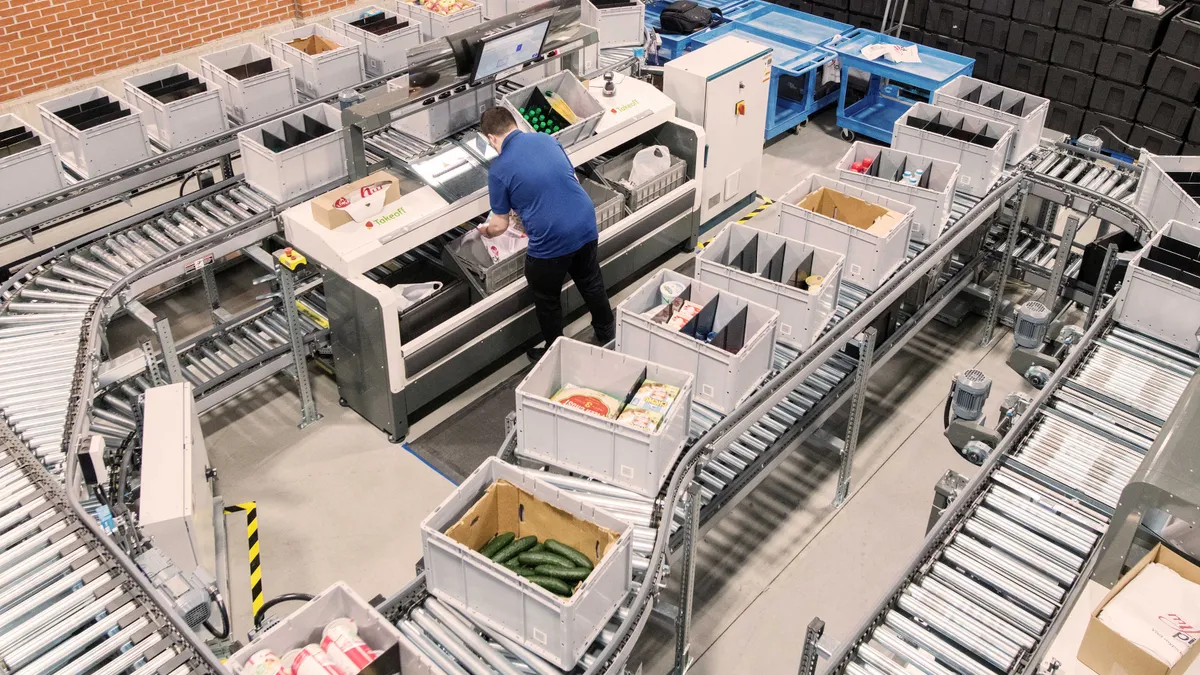Both grocers and fast food companies are looking for new ways to get online orders in the hands of customers. So what if they combined forces?
Takeoff Technologies, which sells automated micro-fulfillment technology to retailers, is currently working with a retailer on a project to meld online grocery service with fast food delivery, according to a top company official.
Through the arrangement, shoppers will be able to order groceries from a supermarket run by the retailer and food from a nearby McDonald’s restaurant in a single transaction and have the items delivered together, said Takeoff Chief Business Officer Curt Avallone. Avallone said he could not identify the retailer Takeoff is working with, but described it as a multibillion-dollar company.
The grocer will use a micro-fulfillment center located on the same site as one of its supermarkets to assemble grocery orders and send them by truck to the McDonald’s, where the products will be placed in a locker alongside items from the restaurant, Avallone said. Drivers from companies like Uber will pick up the items from the locker and deliver them to the customer, he said.
Takeoff will supply the lockers, which it is obtaining from refrigeration equipment supplier Hussmann, Avallone said. Takeoff and Hussmann began a strategic alliance in 2021 under which the companies are working together to develop solutions for retailers.
“It's always been part of our plan to build MFCs that then create new competitive advantages,” Avallone said.
The grocery store and McDonald’s are close enough to allow groceries to be assembled by the MFC and brought to the locker within 30 minutes, Avallone said, adding that Takeoff expects the joint grocery- and fast food-delivery service to begin operating later in 2023.
The ability to combine grocery with restaurant orders for delivery isn’t entirely new. Delivery provider DoorDash, for one, began offering a service in 2021 that lets customers combine orders across restaurant, grocery and other retail providers. Drivers for the company stop at each location to pick up orders before bringing them to the customer.
Avallone said he hopes the concept Takeoff is working on will provide opportunities for grocery stores and quick-service restaurants to drive sales for each other while spreading the costs of providing quick service to shoppers. For example, retailers could incentivize people to add groceries to a fast-food meal by offering a free sundae if they do so.
“We're not saying it's the flash of lightning that's going to happen, but we believe it's part of the journey where we realize that customer convenience is changing, and that the retailers who think outside of the box on behalf of their customers are going to be the ones that win,” Avallone said.
Avallone said that there will be limitations on which items grocery shoppers will be able to get in conjunction with a fast-food meal. “If the brand partnership was Domino's, they wouldn't want the grocer to give away free pizza as an incentive, but if it was a Chinese restaurant, they might not mind,” he said.
Rekindling retailer interest in micro-fulfillment technology
Avallone said Takeoff has been taking steps to draw grocers to its technology which, like systems from other automation suppliers, is intended to help grocers fill orders faster than human workers can handle them. The company recognizes that grocers have been distracted by the pandemic and, more recently, powerful inflation, and is taking steps to demonstrate how MFCs can provide value to retailers by helping them serve customers faster and more efficiently, he said.
“I think it'll be part of their arsenal. How they deploy it depends upon their sense of urgency in the space, for competitive reasons or their vision to change the customer convenience experience,” Avallone said. “It’s understandable how there's been so much going on in the last five years for them that MFCs are still kind of a question mark for most of them.”
Takeoff, which was founded in 2016 and has raised about $200 million from investors, has sold 120 MFCs to retailers and has so far installed 30 of the facilities. The company, which works with Austrian automation company Knapp, counts Albertsons, ShopRite, Associated Wholesale Grocers, Canadian grocery chain Loblaws and Australian retailer Woolworths among its clients.
In January, Albertsons opened a Takeoff-supplied MFC at a Pavilions store in Laguna Niguel, California, the 10th automated site the grocer has deployed through its partnership with the automation company. Avallone said he could not provide details about whether Takeoff will be providing additional MFCs to the grocer.
“I think we just try and do what's best to serve Albertsons, and if we're doing a good job, hopefully, there'll be opportunity for us,” he said.
An Albertsons spokesperson declined to comment on the grocery chain’s relationship with Takeoff.
Catherine Douglas Moran contributed reporting to this story.
Correction: A previous version of this story incorrectly stated the location of the micro-fulfillment center that Albertsons and Takeoff opened in January. The facility is located in Laguna Niguel, California.





















